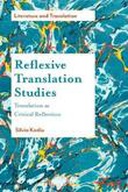Explore

In the past decades, translation studies have increasingly focused on the ethical dimension of translational activity, with an emphasis on reflexivity to assert the role of the researcher in highlighting issues of visibility, creativity and ethics. In Reflexive Translation Studies, Silvia Kadiu investigates the viability of theories that seek to empower translation by making visible its transformative dimension; for example, by championing the visibility of the translating subject, the translator’s right to creativity, the supremacy of human translation or an autonomous study of translation.
Inspired by Derrida’s deconstructive thinking, Kadiu presents practical ways of challenging theories that argue reflexivity is the only way of developing an ethical translation. She questions the capacity of reflexivity to counteract the power relations at play in translation (between minor and dominant languages, for example) and problematises affirmative claims about (self-)knowledge by using translation itself as a process of critical reflection.
This book is included in DOAB.
Why read this book? Have your say.
You must be logged in to comment.
Rights Information
Are you the author or publisher of this work? If so, you can claim it as yours by registering as an Unglue.it rights holder.Downloads
This work has been downloaded 165 times via unglue.it ebook links.
- 7 - pdf (None) at Google Books.
- 68 - pdf (CC BY) at Unglue.it.
- 66 - pdf (CC BY) at OAPEN Library.
Keywords
- Derrida
- Language
- Linguistics
- philosophy of language
- reflexivity
- thema EDItEUR::C Language and Linguistics::CF Linguistics::CFA Philosophy of language
- thema EDItEUR::C Language and Linguistics::CF Linguistics::CFP Translation and interpretation
- Translation & interpretation
- translation studies
Links
DOI: 10.14324/111.9781787352513Editions

